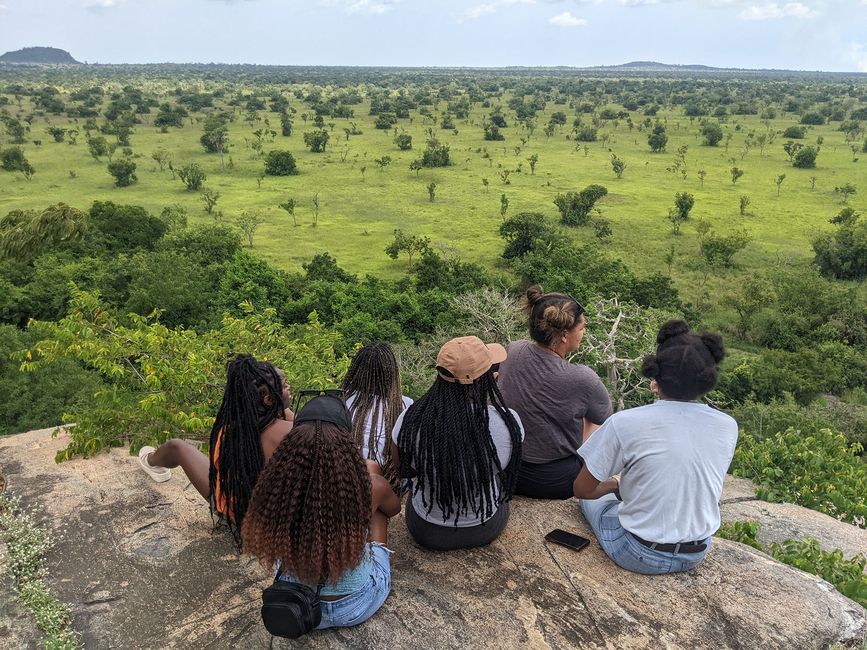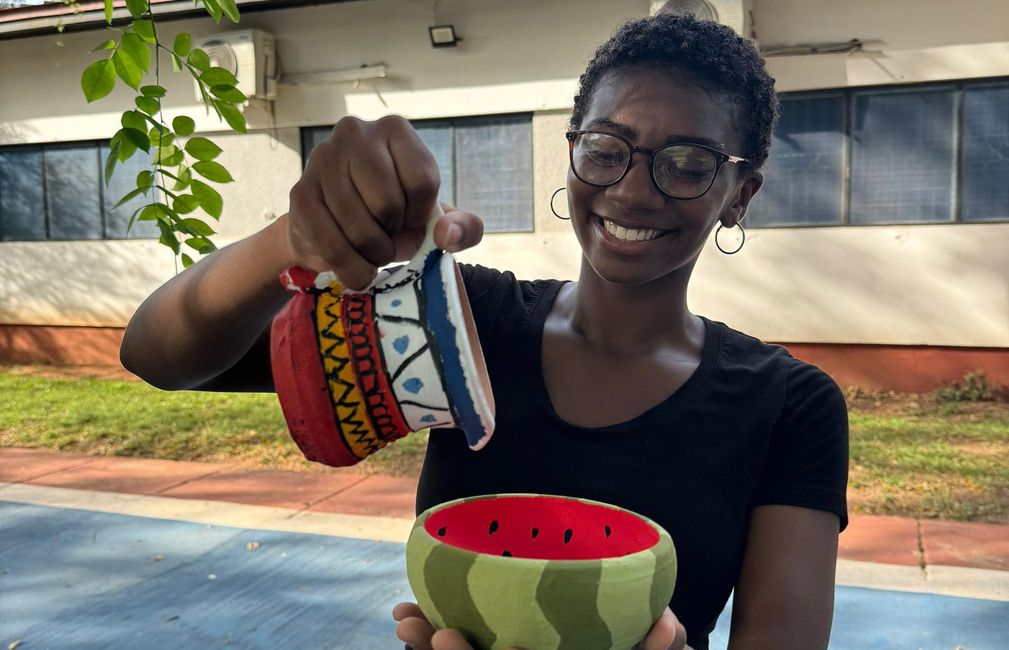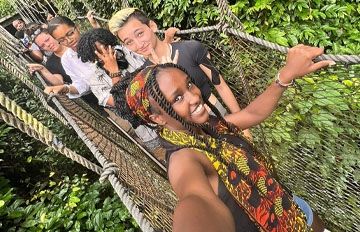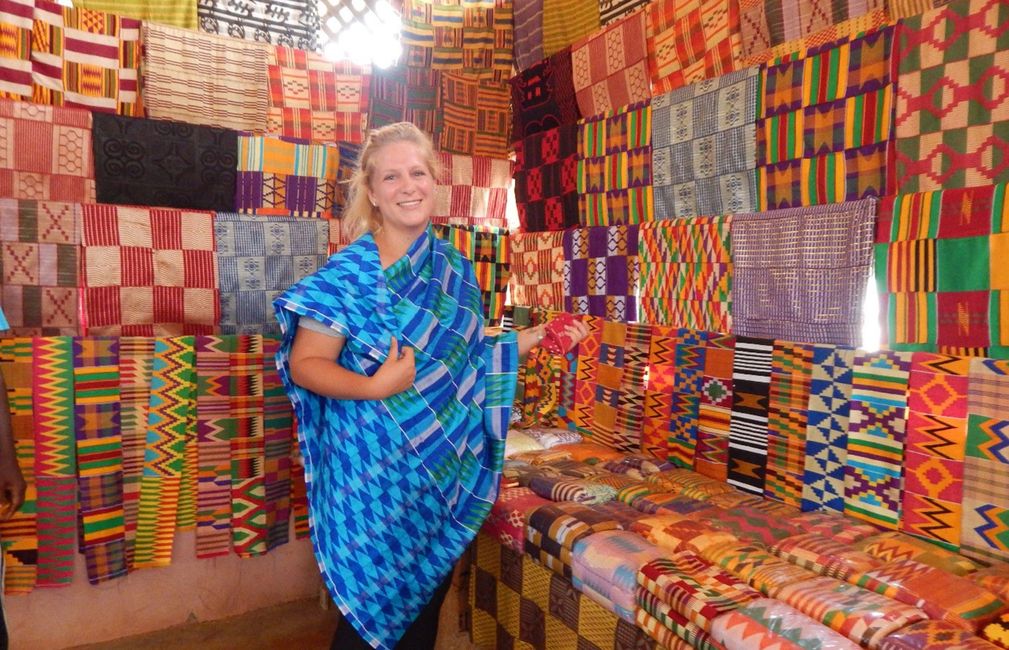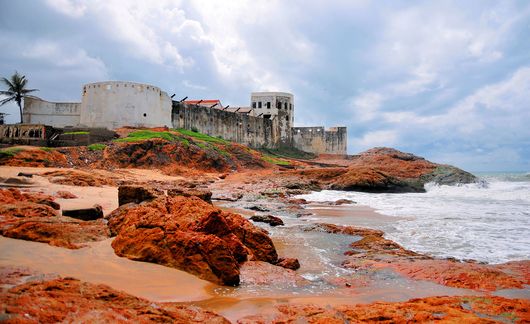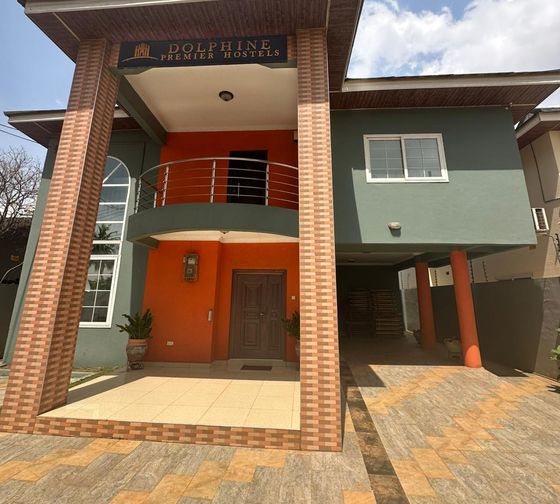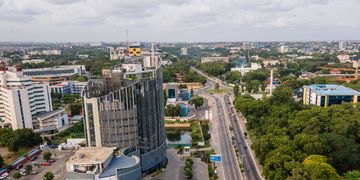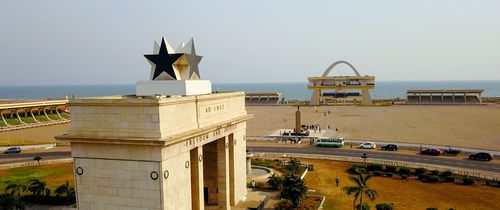
Semester in Legon
Unique Experiences
Make your own
tie-dye and batik cloth
Learn to cook local meals
like red-red and jollof
Learn traditional or contemporary
Ghanaian dances
80+
LANGUAGES SPOKEN BY THE VARIOUS ETHNIC GROUPS IN GHANA
33.48 M
GHANA’S POPULATION
32
UNESCO-DOCUMENTED HISTORICAL FORTS AND CASTLES ALONG GHANA’S SHORE
Your Destination
Legon’s well-educated citizens welcome international students with open arms to their quiet suburban town, just northeast of the city center in the Accra Metropolis District. The sprawling University of Ghana campus is top ranked as the 1st in West Africa and 15th in Africa.
Students also enjoy access to a large shopping mall and several grocery stores, as well as restaurants and bars. Beyond Legon is the Kakum Rainforest reserve, Shai Hills wildlife park, and beaches to explore.
The Culture

Excursions & Activities
- Travel to Cape Coast and Elmina to see slave castles and the starting point of the Transatlantic journey they were forced to take
- Visit the Ashanti region to explore the traditional chieftaincy institution, history, and culture as well as the role women play in the making and unmaking of chiefs among the Ashanti people
- Experience regional highlights like Aburi Botanical Gardens, Tetteh Quarshie Cocoa Farm, Boti Falls, Kwame Nkrumah Mausoleum, Lake Volta, and the W.E.B. Dubois Center
- Get involved on-campus by joining a music, theater, or art group, or meet up with Ghanaian students for soccer, running, swimming, field hockey, or tennis; basketball and baseball are also getting popular
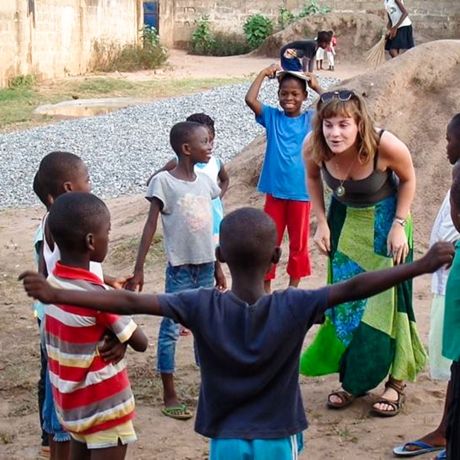
Projects
Internships: There are plenty of options to earn credits and beef up your resume with international experience in the Ghanian working market. A for-credit internship in English allows students the opportunity to have practical work experience in a company within a variety of industry sectors. In addition to the on-site business experience, students participating in an internship program have a weekly classroom component, which provides academic support to their practical experience. Students applying for an internship are required to submit additional materials during the course selection process.
Directed Independent Research: Directed Independent Research is for qualified students who have demonstrated academic rigor and curiosity toward a particular research topic. To be accepted into this course, students must submit a structured proposal during course selection with topic of exploration, significance of research topic as it relates to Ghana, methodology, a literature review, and a schedule of research milestones. Upon research completion, students will present their findings to a panel of academics.
Service-learning Projects: Combine course-based learning with practical, relevant project experience to meet a community-defined need. Interested students are required to submit additional materials during the course selection process.
Program Blogs
Exploring Ghanaian Cuisine!
When people asked what I was most excited about when preparing for my semester abroad I replied with "dance, music, and food!" In regards to food specifically, I was looking... keep reading
Arrival In Accra, Ghana: First Impressions and Observations
Who let me book a solo flight to Ghana?! This is what I thought in the days leading up to my departure. I viewed the trip ahead with much anticipation... keep reading
One Village, One History, One Craft
Vume is a small town in the Volta Region of Ghana, which is known for the art of clay pottery. When the craft was introduced, the people of Vume were... keep reading
Housing & Meals
Housing
CIEE Legon offers various housing options, which include homestays, off-campus hostel, and off-campus apartment-style housing. Housing options are located around the Legon campus, with convenient access to downtown Accra (roughly 60 minutes drive) but are close to the CIEE Legon study center on campus (30 to 45 minutes drive).
Standard Housing: Includes a single/double room at a homestay or a triple or quad-room at an off-campus hostel located within a 30-minute drive from CIEE Legon. (Estimate an additional 15-30 minutes commute time when traffic is heavy or there is difficulty in getting public transport.) Homestays boast a kitchen, living room, and bathroom shared with a host family or bathroom ensuite rooms. The off-campus hostel offers triple or quad-occupancy en-suite rooms, with shared common spaces such as the fitted kitchen and 2 lounge areas.
Select Plus Housing: Includes a single-occupancy air-conditioned room in apartment-style housing off-campus, located within 20 minutes from CIEE Legon. (Estimate an additional 15-30 minutes commute time when traffic is heavy or there is difficulty in getting public transport.)
Select Plus housing requires an additional fee.
A note: The default criterion to assign housing is first-come, first-served; however, other factors may also be considered. If we cannot accommodate your first housing choice, we'll let you know before you arrive. Non-standard housing options require an additional fee that can be found in the program Dates and Fees.
Meals
Homestay: Hosts provide breakfast and dinner during the week, and students get lunch on their own. Hosts provide all three meals on weekends.
Hostels/Apartment-style Housing: Meals are not included. Students prepare meals (facilities are limited) or eat on or off campus from the myriad of food places available.
Academics
This program welcomes students from all academic disciplines who want to continue their studies while learning about Ghana, its people, and the predominant language, Twi. Popular areas of study include political science, public health, biochemistry, economics, history, dance, and music.
Students join the University of Ghana (UG), the oldest, most diverse campus community and largest university in the country. UG welcomes more than 53,000 students from over 87 countries and about 1,250 faculty members from 22 countries. Programs include agriculture (featuring three research stations), consumer sciences, economics, computer science, engineering, performing arts, law, medicine, natural sciences, social sciences, business, nursing, public health, African studies, international relations, mathematics, journalism and communication, population studies, statistical research, social research, and economic research.
Courses are taught by faculty members from the University of Ghana.
*Spring 2025: Only first-year, odd-numbered courses will be available at the University of Ghana.
Arizona State University: Enhance your international academic coursework with optional online courses that best align with your degree requirements and interests. ASU offers thousands of online courses in asynchronous sessions that fit within the CIEE academic calendar, so you can study abroad with CIEE while continuing to meet all your academic goals.
Course Information
Course Information
Students should review their academic plan with their academic advisor before departure. Students will select their courses upon arrival.
In the Fall term, even-numbered courses are offered, and in the Spring term, odd-numbered courses are offered*.
- First-year courses are odd numbered from 100-199.
- Second-year courses are numbered from 200-299.
- Third-year courses are numbered from 300-399.
- Fourth-year courses are numbered from 400-499.
A list of University of Ghana (UG) courses is available on the UG website within the Student Handbook. (Spring 2025: only first-year, odd-numbered courses are available.) Not all courses within UG Colleges or Schools are appropriate for program participants. Students are advised to be flexible in course selection and not necessarily expect to fulfill specific major requirements from their home institution, due to possible changes in the courses offered each term.
Academic Projects
Communication, Journalism, and Media
Health Professions and Related Programs
History, Philosophy, Religion
Social Sciences
Visual and Performing Arts
Academic Projects
Communication, Journalism, and Media
Health Professions and Related Programs
History, Philosophy, Religion
Social Sciences
Visual and Performing Arts
Academic Projects
Communication, Journalism, and Media
Health Professions and Related Programs
History, Philosophy, Religion
Social Sciences
Visual and Performing Arts
University of Ghana (UG)
IMPORTANT: For the Spring 2025 semester, only first-year, odd-numbered courses are available at the University of Ghana.
UNIVERSITY OF GHANA FIRST-YEAR SPRING 2025 COURSE LIST:
| COURSE CODE | COURSE TITLE | CREDITS |
|---|---|---|
| CHEM 111 | General Chemistry I | 3 |
| PHYS 101 | Practical Physics I | 1 |
| PHYS 113 | Mechanics and Thermal Physics 2 | 2 |
| MATH 101 | General Mathematics | 3 |
| ABCS 101 | Introduction to Animal Biology | 3 |
| STAT 101 | Introduction to Statistics | 3 |
| BAHS 103 | Introduction to Microbiology | 3 |
| BAHS 113 | Introduction to Computer Studies | 1 |
| AGEN 101 | Agricultural Engineering I | 2 |
| ANIM 111 | Biology of Farm Animals | 2 |
| CROP 111 | Introduction to Agricultural Botany | 2 |
| SOIL 101 | Introduction to Soil and the Environment | 2 |
| FCOS 101 | Introduction to Foods & Nutrition | 2 |
| FCOS 103 | Introduction to Textile Fibres & Fabrics | 3 |
| FAEN 101 | Algebra | 4 |
| FAEN 103 | Basic Mechanics I | 3 |
| FAEN 107 | General Chemistry | 3 |
| FAEN 109 | General Physics | 3 |
| AREN 101 | Engineering Graphics | 3 |
| FAEN 105 | Engineering Drawing with CAD | 3 |
| CPEN 101 | Engineering Computational Tools | 2 |
| EASC 101 | Physical Geology | 3 |
| MATH 121 | Algebra and Trigonometry | 3 |
| MATH 123 | Vectors and Geometry | 3 |
| ENGL 121 | Foundation English I (Writing Skills) | 3 |
| LNGS 101 | Introduction to Linguistics | 3 |
| GHLS 111 | Ghanaian Language Proficiency for Beginners | 3 |
| ARAB 101 | Introduction to Arabic Studies | 2 |
| ARAB 103 | Elementary Arabic Grammar I | 2 |
| CHIN 101 | Introduction to Chinese Studies | 2 |
| CHIN 103 | Elementary Chinese Grammar I | 2 |
| KISW 101 | Introduction to Kiswahili Studies | 2 |
| KISW 103 | Elementary Kiswahili Grammar I | 2 |
| RUSS 101 | Introduction to Russian Studies | 2 |
| RUSS 103 | Elementary Russian Grammar I | 2 |
| SPAN 101 | Introduction to Spanish Studies | 2 |
| SPAN 103 | Elementary Spanish Grammar I | 2 |
| FREN 121 | Oral Skills and Informal Written Expression | 3 |
| DANS 103 | Dance Forms of Ghana | 3 |
| MUSC 131 | Introduction to Music | 2 |
| MUSC 133 | Practicals and Ensemble I | 1 |
| THEA 111 | Literary Orientation to the Theatre | 3 |
| ARCH 111 | Approaches to the Study of the Past | 3 |
| HIST 111 | Earliest Civilizations | 3 |
| PHCL 101 | Civilisations of the Ancient World | 3 |
| SREL 111 | Introduction to Islam | 3 |
| ECON 101 | Introduction to Economics I | 3 |
| GEOG 111 | Introduction to Physical Geography | 3 |
| POLI 111 | Introduction to the Study of Political Science | 3 |
| PSYC 101 | Elements of Psychology | 3 |
| SOCI 121 | Principles of Social Organization | 3 |
| SOWK 111 | Development and Social Issues | 3 |
| ADLT 101 | Introduction to Adult Education | 3 |
| INFS 111 | Information in Society | 3 |
| PESS 101 | Sport in the Making of the Modern World I | 3 |
College of Humanities
Business School
School of Law
School of Arts
School of Languages
School of Social Sciences
School of Performing Arts
College of Basic and Applied Sciences
School of Physical and Mathematical Sciences
School of Biological Sciences
School of Agriculture
School of Engineering Sciences
School of Veterinary Medicine
College of Health Sciences
School of Nursing
School of Pharmacy
School of Public Health
College of Education
School of Information and Communication Studies
School of Education and Leadership
CIEE proudly partners with ASU to deliver asynchronous, online coursework that aligns with your degree requirements from anywhere you study abroad.
CIEE and ASU offer courses online per program eligibility, at no additional charge. Be sure to review online courses with your home school advisor.
Check the CIEE Program Dates and ASU start dates below to maximize course options within your program!
Search ASU Online Courses BROWSE FAQs for more INFO
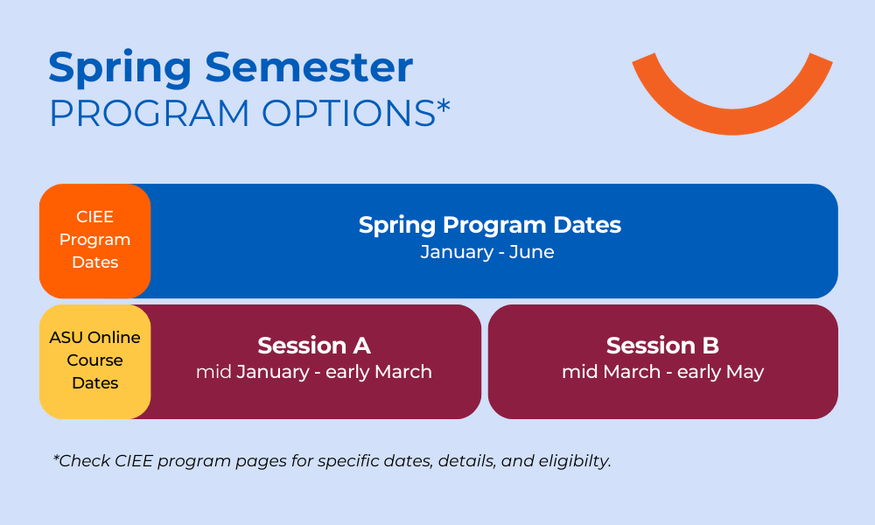
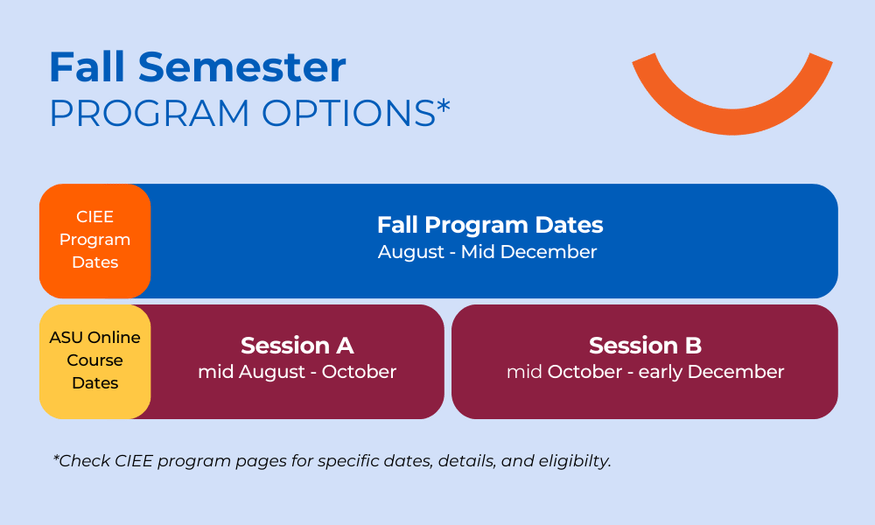
Note: This course listing is for informational purposes only and does not constitute a contract between CIEE and any applicant, student, institution, or other party. The courses, as described, may be subject to change as a result of ongoing curricular revisions, assignment of lecturers and teaching staff, and program development. Courses may be canceled due to insufficient enrollment.
"(GI)" denotes courses that originated at CIEE's Global Institutes and that are offered at multiple CIEE sites.
Discover Internship Opportunities
We're excited you're considering this program! Next, explore the types of internships you can choose from for an epic internship abroad with CIEE Study Abroad.
Explore Industry Options
Ghana's work scene is vibrant and diverse, driven by a growing creative economy in the arts and traditional sectors like trade and services. It reflects a dynamic blend of innovation and cultural heritage, making it a hub across various fields.
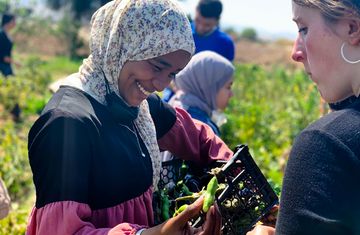
Agriculture, Food and Natural Resources
Gain experience in agricultural markets, agribusiness companies, and NGOs to study food production and global processes.
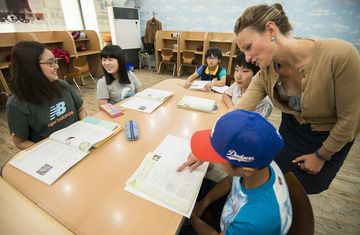
Education and Training
Experience international teaching methodologies and curriculum development in classrooms around Jordan, Spain, and more.

Health Science
Immerse yourself in global healthcare systems to study cross-border medical practices and address public health challenges.
Browse Internship Opportunities
Explore internship placements available through this program to find the right fit for your academic and professional goals.
Disclaimer: Internship placements are subject to availability and host employer hiring discretion. Application and payment of CIEE fees does not guarantee specific placement. This internship listing is for informational purposes only and does not constitute a contract between CIEE and any applicant, student, institution, or other party.
Scholarships & Grants
CIEE offers scholarships and grants annually to help students like you make your study abroad dream a reality.
Students who apply to this program are eligible for the following scholarships and grants:
- Wollitzer Merit Scholarships in Area or Comparative Studies
- Ping Scholarships for Academic Excellence
- CIEE Gilman Go Global Grant
- MSI Grant
- Trailblazer Grant
To be considered, submit the CIEE Scholarships & Grants application within your CIEE program application.
Dates & Fees
You get more for every dollar when you study abroad with CIEE, because our high-quality programs include everything from excursions to insurance. There are no hidden charges, and no disappointing surprises when you arrive.
Program |
Application Due |
Start Date |
End Date |
Fees & Housing |
|---|---|---|---|---|
| Program Fall 2025 13 weeks | Start Date * | End Date * | Fees & Housing $19,950 | |
| Program Academic year 2025-2026 34 weeks | Start Date * | End Date * | ||
| Program Spring 2026 17 weeks | Start Date * | End Date * | ||
| Program Spring 2025 18 weeks | Application Due Deadline Passed | Start Date | End Date | Fees & Housing $19,950 |
*Dates for this program are provided as tentative dates. Please consult with your study abroad advisor to confirm dates before purchasing your flights.
To help you budget, keep in mind that students are responsible for the cost of international airfare, local transportation, books and supplies, visas, and personal expenses. In addition, your college or university may charge additional fees for study abroad, or may require you to receive a transcript via CIEE's School of Record, which carries an additional fee of $500.
Program Fees
CIEE offers the most student support of any provider in its program fee, including an airport greeting, full-time leadership and support, orientation, cultural activities, local excursions, pre-departure advising, and CIEE iNext travel protection with benefits.
| Participation Confirmation | $300 * |
| Educational Costs | $15,206 ** |
| Housing | $4,250 *** |
| Insurance | $194 |
| Total Fees | $19,950 |
Optional Housing
CIEE accommodation options are detailed in the Housing section. Based on availability, Select or Select Plus Housing can be chosen during the application process for an additional fee. Housing is assigned on a first-come, first-served basis; however, other factors may also be considered.
| Select Plus Housing Fee | $2,100 |
Financial Aid
CIEE offers the most grants and scholarships of any study abroad organization, including $8 million/year in travel grants, merit-based scholarships, institutional and MSI grants, and Gilman Go Global Grants.
Estimated Costs
Students are responsible and manage costs related to travel, meals, books, and personal expenses. Below are estimates for consideration.
| Meals not included in program fee | $510 † |
| International Airfare | $1,550 †† |
| Local Transportation | $700 |
| Books & Supplies | $100 |
| Visa Fees | $240 ††† |
| Personal expenses | $240 †††† |
| Other | $500 ††††† |
| Total Costs | $3,840 |
*non-refundable fee
**direct cost of education charged uniformly to all students
***Housing fees listed are for financial aid purposes only and should not be considered a basis for calculation of refunds.
†For students in homestays, families provide 2 meals a day and all weekend meals. For students in residence halls/hostels, you should budget approx. $340 per month for groceries if you plan on making your own meals, and more if you plan on eating out regularly.
††round-trip based on U.S. East Coast departure
†††Visa application in the US+non-citizen ID card
††††$100 emergency fund + cell phone expense + toiletries
†††††Yellow Fever Vaccination - All travelers must present a vaccination card upon entry to Ghana. Costs and insurance coverage may vary. CIEE recommends booking an appointment for the vaccine well in advance.
Program Fees
CIEE offers the most student support of any provider in its program fee, including an airport greeting, full-time leadership and support, orientation, cultural activities, local excursions, pre-departure advising, and CIEE iNext travel protection with benefits.
Financial Aid
CIEE offers the most grants and scholarships of any study abroad organization, including $8 million/year in travel grants, merit-based scholarships, institutional and MSI grants, and Gilman Go Global Grants.
Estimated Costs
Students are responsible and manage costs related to travel, meals, books, and personal expenses. Below are estimates for consideration.
Program Fees
CIEE offers the most student support of any provider in its program fee, including an airport greeting, full-time leadership and support, orientation, cultural activities, local excursions, pre-departure advising, and CIEE iNext travel protection with benefits.
Financial Aid
CIEE offers the most grants and scholarships of any study abroad organization, including $8 million/year in travel grants, merit-based scholarships, institutional and MSI grants, and Gilman Go Global Grants.
Estimated Costs
Students are responsible and manage costs related to travel, meals, books, and personal expenses. Below are estimates for consideration.
Program Fees
CIEE offers the most student support of any provider in its program fee, including an airport greeting, full-time leadership and support, orientation, cultural activities, local excursions, pre-departure advising, and CIEE iNext travel protection with benefits.
| Participation Confirmation | $300 * |
| Educational Costs | $15,206 ** |
| Housing | $4,250 *** |
| Insurance | $194 |
| Total Fees | $19,950 |
Optional Housing
CIEE accommodation options are detailed in the Housing section. Based on availability, Select or Select Plus Housing can be chosen during the application process for an additional fee. Housing is assigned on a first-come, first-served basis; however, other factors may also be considered.
| Select Plus Housing Fee | $1,500 |
Financial Aid
CIEE offers the most grants and scholarships of any study abroad organization, including $8 million/year in travel grants, merit-based scholarships, institutional and MSI grants, and Gilman Go Global Grants.
Estimated Costs
Students are responsible and manage costs related to travel, meals, books, and personal expenses. Below are estimates for consideration.
| Meals not included in program fee | $510 † |
| International Airfare | $1,550 †† |
| Local Transportation | $700 |
| Books & Supplies | $100 |
| Visa Fees | $240 ††† |
| Personal expenses | $240 †††† |
| Other | $500 ††††† |
| Total Costs | $3,840 |
*non-refundable fee
**direct cost of education charged uniformly to all students
***Housing fees listed are for financial aid purposes only and should not be considered a basis for calculation of refunds.
†For students in homestays, families provide 2 meals a day and all weekend meals. For students in residence halls/hostels, you should budget approx. $340 per month for groceries if you plan on making your own meals, and more if you plan on eating out regularly.
††round-trip based on U.S. East Coast departure
†††Visa application in the US+non-citizen ID card
††††$100 emergency fund + cell phone expense + toiletries
†††††Yellow Fever Vaccination - All travelers must present a vaccination card upon entry to Ghana. Costs and insurance coverage may vary. CIEE recommends booking an appointment for the vaccine well in advance.
What's Included
Tuition
Housing
Pre-departure Advising
Advising before you depart to set goals and answer questions
Optional on-site airport meet-and-greet
Orientation
Introduction to your program plus practical information about living in your host city
On-site Staff
Full-time program leadership and support in your city
Cultural and/or Co-curricular Activities
Excursions and/or Study Tours
Travel Protection
CIEE iNext travel protection
24/7 emergency on-site support
Our Staff
Amma Appiah
Center Director
Amma is passionate about intercultural learning in international education and embraces the idea of empathetic study abroad management. As a person living with a chronic illness, Amma also dedicates time to raising awareness on autoimmune rheumatic diseases and advocates for persons living with such in Ghana.
Rachel Akata
Program Coordinator
Rachel supervises student life coordination at the center and assists the director with housing, internship, and volunteer placements.
Mike Adu Ampofo
Faculty and Custom Program Coordinator
Mike earned his bachelor's in Information Technology from Pentecost University in Ghana. He manages all custom and faculty-led groups that come on-site.
Irene Makafui Aku Dotse
Program Coordinator
Irene is responsible for student life coordination at the center and takes care of housing, internship, and volunteer placements.
Get Started
1
2
Connect With Your Campus Study Abroad Office
Share your plans and confirm you're on track to meet all required steps to go abroad.
3
Contact CIEE
We're here to help! Send us an email if you still have questions or need information about applying to this program.
4
Interested in an optional internship?
After being accepted to this program and submitting the required internship documents, work with CIEE staff on your internship goals and select which positions to interview for. CIEE will reach out to companies that would be a good fit for you, your interests, and your qualifications. Finalize your internship placement upon arrival!
